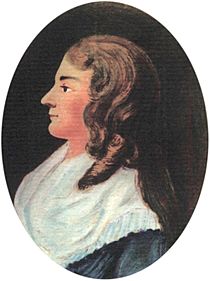Dorothea Erxleben facts for kids
Quick facts for kids
Dorothea Erxleben
|
|
|---|---|
 |
|
| Born |
Dorothea Christiane Leporin
13 November 1715 |
| Died | 13 June 1762 (aged 46) Quedlinburg, Kingdom of Prussia
|
| Education | University of Halle |
| Scientific career | |
| Fields | Medicine |
| Influences | Laura Bassi |
Dorothea Christiane Erxleben (born November 13, 1715 – died June 13, 1762) was a pioneering German doctor. She made history by becoming the very first woman in Germany to earn a university degree in medicine.
Contents
Early Life and Education
Dorothea was born in Quedlinburg, Germany. Her father, Christian Polycarp Leporin, was a doctor in their town. He was very forward-thinking for his time.
Her father quickly noticed how smart Dorothea was. She did very well in her schoolwork. He decided to have her tutored at home. She studied subjects like Latin, math, and science. Her brother, Tobias, studied alongside her.
Christian Polycarp Leporin believed that talented women should not be limited. He felt their skills were wasted if they only stayed in the kitchen. His family believed in new ideas from the Enlightenment. These ideas supported giving everyone the best education.
Tobias planned to study medicine at the University of Halle. Dorothea wanted to follow him. Back then, women needed special permission to attend university. So, Dorothea's father asked King Frederick the Great of Prussia for help. The King agreed to her request in April 1741. This allowed Dorothea to enter the University of Halle.
University and Family Life
Dorothea's admission to university caused a lot of talk. Some people criticized it, saying women shouldn't practice medicine. Others admired her courage and talent.
One critic, Johann Rhetius, wrote that it was a waste of time. He argued that women were not allowed to be doctors by law. Dorothea did not respond publicly to these arguments. Instead, she wrote down her own thoughts.
In 1742, her ideas were published as a book. It was called 'A Thorough Inquiry into the Causes Preventing the Female Sex from Studying'. In her book, Dorothea argued that Germany should use the talents of all its people. Her father wrote the introduction. He spoke about the need for universities to change. He believed that allowing women would help these changes happen.
Even after being accepted, Dorothea put her studies on hold. At age 26, she married Johann Christian Erxleben. He was a widower with five children already. Dorothea and Johann had a happy marriage. They had four more children together over the next few years.
Dorothea was very busy at home with her nine children. But she still managed to continue her medical studies. She did this at a slower pace, fitting it in with her family life.
A big influence on Dorothea's life was Laura Bassi. Laura Bassi was an Italian physicist. She was the first woman in the world to become a university professor.
Becoming a Doctor
In 1747, Dorothea's father passed away. Her husband's health also started to get worse. This left their family with many debts. To help pay these off, Dorothea began to practice medicine. She worked in Quedlinburg, even without a degree. The people in town greatly respected her medical skills.
However, some local doctors felt threatened. They thought Dorothea was taking their patients. They filed a lawsuit against her. They accused her of practicing medicine without proper training. The case went all the way to King Frederick the Great.
In January 1754, the King made a ruling. He said Dorothea had to pass an exam. She also had to write a special paper at the University of Halle. With support from the university's leader, Dorothea did just that.
Dorothea's medical paper was titled 'Concerning the Swift and Pleasant but for that Reason less than Full Cure of Illnesses'. In it, she argued that doctors often prescribed too many unnecessary cures. She believed doctors were too quick to give strong medicines like opiates. She said this happened even for illnesses that didn't need them. She also gave suggestions for using certain medicines correctly.
Her paper quickly became well-known across Germany. Many women with health problems found it helpful. Dorothea even translated it from Latin into German. This made it easier for everyone, especially poorer people, to read.
On June 12, 1754, Dorothea Erxleben earned her M.D. degree. She became the first woman in Germany to achieve this. She spent the rest of her life working as a doctor in her hometown of Quedlinburg.
Legacy and Impact
Sadly, for almost 150 years, no other woman became a doctor in Germany. It wasn't until the early 1900s that women were allowed into German medical schools again.
However, Dorothea Erxleben remains a true pioneer. She opened the door for women in medicine. Her ideas about how to use medicines, especially opiates, were also very important.
Today, clinics and foundations are named after her. On September 17, 1987, Germany honored her. The German Federal Post Office released a special postage stamp with her picture. It was part of a series called "The Women of German History."
On November 13, 2015, Google celebrated her 300th birthday. They featured her with a special Google Doodle.
See also
 In Spanish: Dorothea Erxleben para niños
In Spanish: Dorothea Erxleben para niños
 | Mary Eliza Mahoney |
 | Susie King Taylor |
 | Ida Gray |
 | Eliza Ann Grier |

